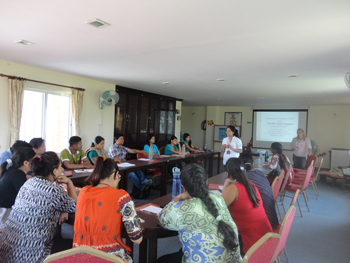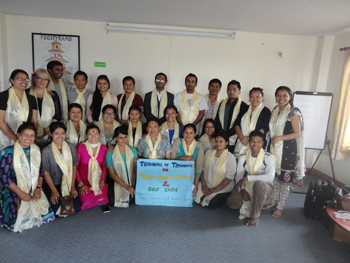
Chhori Maharjan is a PsyD candidate at the California Institute of Integral Studies. Chhori is associated with the Nepal Youth Foundation, and has been working in Ankur Counseling and Training Center, one of NYF's programs, as a program manager and principal counselor since 2006. Chhori is a previous recipient of an ACBS Developing Nations Scholarship that allowed her to travel to the ACBS World Conference in 2012. In the following paragraphs, Chhori reflects on her recent return to her native Nepal where she worked to support people there in the aftermath of the earthquakes that affected the population there.
--
 After the devastating earthquake in Nepal, I went to Nepal for four weeks in the month of May. During that time, I saw my family, friends and many others struggle to manage their basic needs of food, shelter and safety. It was difficult to witness the hardship caused by the lack of comfortable night’s sleep, adequate meals and rest bite from the very hot weather. However, people are fighting with it as much as they can. I admire their power to face enormous burdens caused by this disaster. In addition, the people in the countryside are not getting help due to the lack of transportation. Both the government and nongovernment relief distributing organizations and individuals are still having trouble trying to reach the villages.
After the devastating earthquake in Nepal, I went to Nepal for four weeks in the month of May. During that time, I saw my family, friends and many others struggle to manage their basic needs of food, shelter and safety. It was difficult to witness the hardship caused by the lack of comfortable night’s sleep, adequate meals and rest bite from the very hot weather. However, people are fighting with it as much as they can. I admire their power to face enormous burdens caused by this disaster. In addition, the people in the countryside are not getting help due to the lack of transportation. Both the government and nongovernment relief distributing organizations and individuals are still having trouble trying to reach the villages.
The majorities of school buildings were collapsed or damaged. Students and teachers are now holding school classes under trees, in zinc roofed shelters and open places, despite the extreme heat from the sun. Of course the monsoon season is heading towards Nepal. This will cause awful landslides and floods. In past, the monsoon took, thousands of lives and houses. It seems another disaster waiting to happen that will only serve to break the hearts of Nepalese survivors.
As a mental health worker, I am concern about the many untrained, but well-meaning, people acting as counselors. I observed negative manipulating, in that people were led to believe they were victims, which serves to increase the likelihood of negative attitudes developing. I rather the people be helped to think of themselves as survivors, a more positive position in which to move forward. The country is in great need of professionally trained therapists.
Understanding Culture, Values, Spiritual and Social Ways
In my experiences working and being a Nepali citizen, I think international organizations coming to help first needs to understand our culture, values, spiritual and social ways. Second, they need to develop appropriate psychological approaches as well as offer relief programs and materials. Many organizations and individuals were not conscious about what the community really wanted in the way of help. An example in this regard; an organization that was concerned about children and their psychological wellbeing after the earthquake, provided a number of toys and other forms of art in a shelter. When we asked them first to feed the children they argued that toys would be better! Our organization, Nepal Youth Foundation (NYF; http://www.nepalyouthfoundation.org/), decided to provide nutritious food when the children come for play. That made the children happy; after their tummy is happy they can play all day along. In addition, their parents expressed their expressed their joy and thanked us for taking care of their children’s mental and physical health. This is only one case of many where we saw international organizations insensitive to requests from the people themselves. I also observed competition to establish their name and fame, biases in services based upon their targeted groups. It was sad to see greediness and a lack of cooperation and unity.
Regarding psychological perspective many international organizations are now focusing on different interventions and focusing on post-traumatic stress disorder. While most of them do not even know that post-traumatic stress disorder as a diagnosis is valid in the Nepal. These technical terms, exaggeration of the consequences, as well as using the people as a laboratory are serious concerns for me. I wanted to protect their innocent mind and cultivate overall wellbeing. In addition, the life style, perception towards wellbeing and their spiritual components plays vital role rather than simply adopting Western interventions to provide them psychological support.
Utilising existing strengths and forms of support
Nepalese people are more inclined to hold on their culture and their values, which is one of the major components to benefit their emotional health during this devastating situation. They live together, work for each other, feed and nurture as per need. I found most of their resilience has been to support one another. Rituals and worship is something they love to do every day. They have been jointly organizing rituals for forgiveness to the Earth. The forgiveness ritual has been powerful in restoring their normal life and bringing back their confidence to find the new hope in their life.
Some of the organizations were using forms of psychotherapy right after the earthquake which was not consistent with international guidelines, but some are working with a sensitivity to cultural ways as well as models such as trauma focused therapy. Many other organizations are offering different forms of meditation, but there are questions about its effectiveness and the consequences. I must admit that in Nepal, I know of no one trained as a therapist who is adequately skillful in this needy situation. Therefore, this is a crisis situation. Finding able therapists and effective forms of psychotherapy for the Nepalese people is imperative.
Holding People’s Suffering
My organization, NYF, specializes in caring for children and youth. NYF mobilized trained psychosocial counselors into the community. The aim was just to validate and witness their sufferings, presence of a compassionate loving kind person, a skillful communicator to hold their psychological state of mind. These three key strategies were applied in children, parents, teachers, women, volunteers and all the community people. It appear to work because all of them agreed that they were only looking for a person who would hear and hold their sufferings and terrifying experiences and who could understand and validate their position It was a self-healing experience for us in NYF. We come up with a conclusion that during the crisis situation, a simple human kindness and compassionate heart could be a great help and it can make a huge impact in the survivor’s life
We have been serving orphaned children, youths, the parents, and community people. From our work experience, we learned that if we really want to take care of people, we just need to be available with skillful concern. This approach will bring them joyful moments, even after going through life threatening experiences. In the last date of my stay I witnessed some of them relaxed and moving towards emotional stability’.
--
We thank Chhori for taking the time to share her reflections on the important work that she, and the organizations that she was working with, have been doing in Nepal. During her visit to Nepal Chhori also metwith Dr Louise Hayes of the ACBS who has been spending time in Nepal. Chhori wished to thank Louise for the support that she provided to people affected by the earth quakes.
To help the ACBS to support the development of clinicians and researchers who are working to build capacity for mental health services in low and middle-income countries, please consider donating to the ACBS Developing Nations Fund:
https://contextualscience.org/developing_nations_fund
Ross White
Chairperson of ACBS Developing Nations Committee

